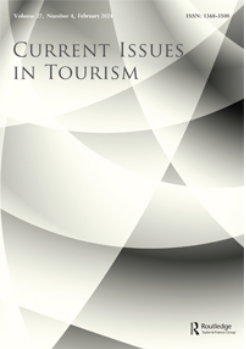认识居民环境责任行为:认知-情感-态度-行为模型视角
IF 4.6
3区 管理学
Q1 HOSPITALITY, LEISURE, SPORT & TOURISM
引用次数: 0
摘要
摘要目前的研究考察了认知(环境知识)、情感(环境敏感性)、态度(地点依恋和可持续态度)和行为(环境负责行为和对可持续旅游发展的支持)之间的相互作用。388名居民接受了调查。采用结构方程模型检验研究构件之间的直接和间接关系。结构模型结果发现,环境知识对可持续态度的影响显著高于环境敏感性。环境知识对环境敏感性的影响是显著的。此外,实证发现可持续态度比环境敏感性更能预测地方依恋。随后,地方依恋对环境责任行为的影响被发现是积极和显著的。最后,研究模型证实居民环境责任行为比地方依恋更能预测旅游可持续发展的支持度。建议推广和实施可持续旅游,并讨论其管理意义。关键词:可持续发展态度;环境责任行为;居民依恋披露声明作者未报告潜在的利益冲突。本文章由计算机程序翻译,如有差异,请以英文原文为准。
Understanding residents’ environmental responsible behaviour: a cognition – affection – attitude – behaviour model perspective
ABSTRACTCurrent research examined the interplay between cognition (environmental knowledge), affection (environmental sensitivity), attitude (place attachment and sustainable attitude) and behaviour (environmental responsible behaviour and support for sustainable tourism development). Three hundred and eighty-eight residents were surveyed. Structural equation modelling was employed to test direct and indirect relationships among study constructs. Structural model results found environmental knowledge as significant predictor of sustainable attitude than environmental sensitivity. Whereas, effect of environmental knowledge on environmental sensitivity was found significant. Further, empirical findings discovered sustainable attitude as more important predictor of place attachment than environmental sensitivity. Subsequently, the effect of place attachment on environmental responsible behaviour was found positive and significant. Finally, study model confirmed residents’ environmental responsible behaviour as more important predictor of support for sustainable tourism development than place attachment. It is suggested that sustainable tourism be promoted and implemented, and its managerial implications are discussed.KEYWORDS: Sustainable attitudeenvironmental responsible behaviourresidentsplace attachment Disclosure statementNo potential conflict of interest was reported by the author(s).
求助全文
通过发布文献求助,成功后即可免费获取论文全文。
去求助
来源期刊

Current Issues in Tourism
HOSPITALITY, LEISURE, SPORT & TOURISM-
CiteScore
15.50
自引率
10.00%
发文量
230
期刊介绍:
Journal metrics are valuable for readers and authors in selecting a publication venue. However, it's crucial to understand that relying on any single metric provides only a partial perspective on a journal's quality and impact. Recognizing the limitations of each metric is essential, and they should never be considered in isolation. Instead, metrics should complement qualitative reviews, serving as a supportive tool rather than a replacement. This approach ensures a more comprehensive evaluation of a journal's overall quality and significance, as exemplified in Current Issues in Tourism.
 求助内容:
求助内容: 应助结果提醒方式:
应助结果提醒方式:


